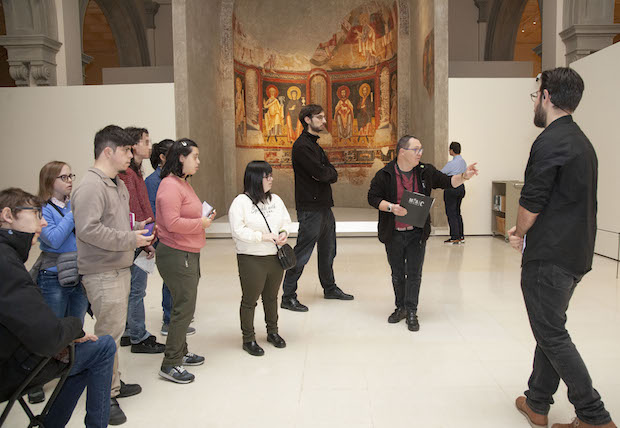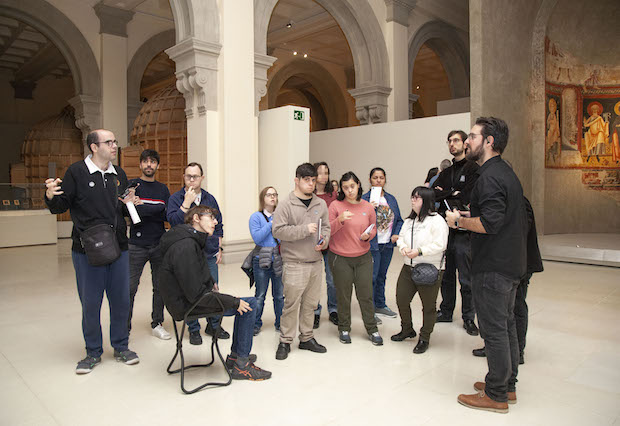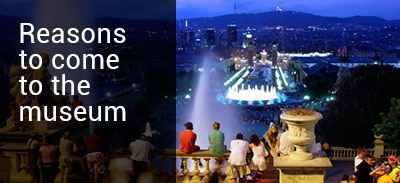Catalan Down Syndrome Foundation, MagmaCultura, Teresa González, David Cabrera, Laura la Lueta, Alba Gimbert, Míriam Marín and Isabel Briz.

An experience of professional skills training for people with functional diversity at the Museu Nacional d’Art de Catalunya
In the post The Museum, a multidisciplinary incubator a setting for discovering my profession, of 12 April 2018, we introduced the idea of the power that museums have to become first-rate professional skills training centres. Since that article, the museum has taken a step further in this direction by signing, on 1 August 2019, the collaboration agreement with the Catalan Down Syndrome Foundation (FCSD) and MagmaCultura. This has enabled us to have David Cabrera working as a trainee Museum Assistant for four months (November 2019 – February 2020).
The experience falls within the framework of the development of the museum’s Plan of Accessibility and Inclusion, and of Social Responsibility, whose aim is, among its inclusive policies, to encourage accessibility in museums and the culture sector with regard to professional and work training.
The Catalan Down Syndrome Foundation’s Col·labora Employment Inclusion Service and the Museum Assistant course at Pompeu Fabra University
The Col·labora Service proposed to design a Museum Assistant course with Pompeu Fabra University in order to give our students the opportunity to get some idea of what a museum is and what it means to become a museum assistant, with the idea of developing the aptitudes and attitudes necessary to do this job satisfactorily, and to boost self-confidence and employment insertion.
This collaboration enables teaching staff at Pompeu Fabra University to use their experience as teachers to introduce the students in the acquisition of the knowledge, skills and attitudes necessary to work in this post, and it allows the Foundation to provide opportunities to the students who are following a training process for jobs related to customer service and auxiliary posts in different services.
FCSD
Collaboration and shared responsibility
It has been a good experience for MagmaCultura. On one hand, the Museu Nacional d’Art de Catalunya’s customer service teams have worked hand in hand with people with functional diversity, thus improving their relationship and experience in customer service. On the other, the rest of the staff, especially the team leaders and coordinating managers, have had the chance to incorporate them in their teams, thus enriching their personal and work experience.
MagmaCultura
Students of the Museum Assistant course visit the Museu Nacional d’Art de Catalunya. Photo: Marta Merida
The experience of working with David Cabrera on a day-to-day basis. Interview with the staff of MagmaCultura
What has this experience given you as professionals and as people?
- Laura la Lueta Romero (Service coordinator)
This experience has given me a lot more than I was expecting initially, in both the personal and the professional areas. I am someone who had never previously established any bonds with a person with functional diversity. When I began to think about David’s arrival, I realized that due to my ignorance I was “afraid” of dealing with this contact and incorporating a person outside the parameters that I had always known in the staff.
I was worried about organizing tasks for him that would not be properly adapted to his needs; saying or doing something that might upset him; or that someone in the team might make him feel uncomfortable with their attitude. The truth is that I soon became aware of my own prejudices. David very quickly became one of the team, and not only did he successfully do the tasks that we had given him to do, but he showed us that he was ready to do a lot more.
- Alba Gimbert Cervigon (Guide)
My experience with David, on both a personal and a professional level, has been very gratifying. He is someone who has easily adapted to the pace of the job and, moreover, he has been very efficient whenever we have had to organize or carry out a task. David is very nice and outgoing.
- Míriam Marín Fernández (Guide)
As a professional I haven’t had any problems when working with David. At all times he has been one more member of the team, eager to take part in the customer services duties.
Personally, it has been a pleasure to meet David Cabrera. He has brought – to my colleagues and me – his empathy, his smile and a different way of viewing life, from his perspective. He has made me reflect on how society sees people as dynamic as him through a distorted lens.
- Isabel Briz Briz (Gallery control)
Working alongside a person with functional diversity has made me see him as a normal person, capable of doing the same things as I do, whom I have to treat with the same respect as the rest of my colleagues.
If I hadn’t taken part in this experience I wouldn’t have…
- Laura la Lueta Romero
If I hadn’t taken part in this experience I wouldn’t have become aware of the unintentional distance that I used to keep with regard to people with disabilities, and the social consequences that this could have. From now on, and after having met David, I hope to be able to identify and develop this awareness.
- Alba Gimbert Cervigon
If I hadn’t taken part in this experience I wouldn’t have been able to meet someone like David, nor remove this small barrier that we sometimes put up when working with people with Down Syndrome.
- Míriam Marín Fernández
I think if I hadn’t taken part in this experience I wouldn’t have been able to get to know David. He has given us a degree of wisdom, and we have been able to learn about how he sees life. It has been a very gratifying experience.
- Isabel Briz Briz
If I had not taken part in this experience I would still have the wrong idea about functional diversity, and I would have missed getting to know David more profoundly.
Anything remarkable, any stories that you would like to mention?
- Laura la Lueta Romero
Rather than telling a story, I would like to point out the joy of finding myself with members of the team who have shown an eagerness and a desire to involve themselves in the experience, and the pleasure of seeing the energy and the passion that David puts into the job. Without a shadow of a doubt, it has been a very good experience.
- Alba Gimbert Cervigon
The most remarkable thing I remember when working with David was his energy in the mornings. Always happy to be here and ready to start work, that’s positive for any team. It was impossible for his enthusiasm not to rub off on us.
- Míriam Marín Fernández
How he treated groups according to the type and how he adapted to each level, empathizing with them, was very curious; not everybody can do that. I was surprised how he was at all times aware of visitors’ needs.
A funny story happened one day when a group of very young schoolchildren came. With these groups we use a puppet called Jeroni, who accompanies them on the tour. To introduce the children to the game I said “Hey David, didn’t Jeroni tell us that the children in the lions’ class would come to see us?” and he replied “No”. That shows that he is a very sincere person and we had a good laugh about it. The children were very young and didn’t realize.
Another day he warned me that a schoolboy was carrying a laser pointer, and thanks to his attention we were able to speak to his teacher, who took it off him.
In short, it has been a fantastic experience for me and I am happy that people like David are given a chance in the world of work.
- Isabel Briz Briz
David is very talkative, but aware of his intellectual diversity. One day, when he was on the entrance door to the Romanesque collection, a visitor spoke to him in English and, he very calmly told him that he should speak to me. He knew that he couldn’t answer in English, but he handled it very naturally and nicely.

I’ve been able to work as a Museum Assistant! Interview with David Cabrera
What do you think your time as a Museum Assistant in the Customer Service Department has given you?
It has given me a lot of things, for example learning things about history, culture. It has given me tranquillity and the chance to talk to people. I felt useful.
If I hadn’t taken part in this experience I wouldn’t have …
If I hadn’t taken part in this experience I wouldn’t have been able to demonstrate what I learned on the Museum Assistant course.
Anything remarkable, any stories you would like to mention?
I recognized visitors from Brazil as soon as I heard them talking at reception, and then I spoke to them in Portuguese. They smiled at me and spoke to me nicely, asking me where the rooms and the exhibitions were, in their language. They were pleased that I spoke to them in Portuguese.
Spontaneously, David wanted to tell us that the general evaluation of his time here is 10 out of 10.
We now hope that David finds his way to developing his work skills. In order for that to be possible, at the museum, and in collaboration with the companies that work with us, we will remain committed to inclusion.
Related links
The museum, multi-disciplinary incubator: a setting for discovering my profession
Apropa Cultura (Getting Closer to Culture): inclusive museum, united museum
EASY-TO-READ: A MUSEUM FOR EVERYBODY
Departament d’Accessibilitat i Inclusió









